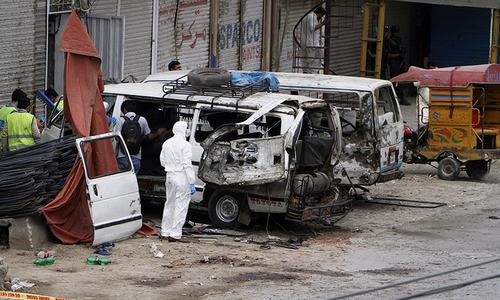On Wednesday, terror returned to Lahore, which we have been officially told was on high alert. Precious lives were cut short; serious injuries were caused to many.
The militants had targeted Pakistan Army soldiers who were on their way to accompany the census enumerators. The vehicle hit had been on its way to drop off the men at various points at the start of the working day.
The government came up with its usual reaction to what appeared to be a suicide attack. There was a show of sympathy for those who lost their lives, which included at least one civilian. There were vows to defeat terrorism. Also tucked in somewhere in the pile of official responses was an old clarification about how difficult — almost impossible — it was to thwart a suicide attack.
Whatever the government might have had to say, the blast did not really come as a surprise. A number of men in uniform — soldiers — moving about in a vehicle in public spaces was surely a risky activity given that the city was on high alert and the country continues to battle militancy.
In such circumstances, surely there was a need for tighter security measures than what appeared to have been taken. Although the relevant authorities in Lahore have not been too forthcoming in their answers to the probing queries put to them by journalists after Wednesday’s tragedy, the suspicion generally is that the suicide assault came about after some reconnaissance on the part of the militants. The latter appeared to know the time the vehicle carrying the army men working with the census teams would arrive at the point where the attack took place.
Lahore was shaken badly. The city has been the venue of many terrorism-related incidents of late, just as it has been at the receiving end of official reassurances since a suicide attack in front of the Punjab Assembly in February.
A favourite measure to instil a sense of security in the citizens was once again on display as the explosion was initially projected as a cylinder blast. This refrain in the immediate aftermath of the explosion had just the opposite effect on the people — it made them angry as they saw it as a move by the government to conceal the facts.
Such prevarication on the part of the authorities may well result in a trust deficit that could prove disastrous in these times.
Published in Dawn, April 6th, 2017













































